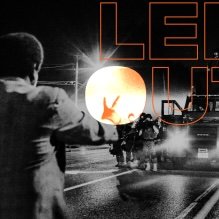ABOUT
In January of 2019 LEFT OUT Magazine was conceptualized by activists, writers and organizers activated by and embedded in the Black Live Matter Movement – the latest explosion of Black Struggle in the last 50 years. It was our participation within this struggle for Black liberation, and in broader struggles for greater labor rights, within the electoral arena, and against the ravages of capitalism, that brought us in closer to a younger and diverse array of working class and poor Black people. The founders of LEFT OUT recognize that these Black folks in particular are seeking to narrate their own struggle for themselves, but have few platforms set up for serious debate and discussion.
Left Out Magazine seeks to provide the space for the voices of a new generation of Leftist working class Black people, anti-racist activists and Black political thinkers.
What People Say
“The last several years has seen a revival in radical Black politics—a necessary counter to the banality of mainstream Black electoral politics. A thriving media has always been critical to the Black Radical Tradition and today is no different. LEFT OUT is poised to be an important platform to host the critical debates of our time. With a white supremacist in the White House, it has never been more urgent to interrogate the history, politics, strategy and tactics in the ongoing struggle for Black liberation in the United States and beyond.”
– Keeanga-Yamahtta Taylor, author, From #BlackLivesMatter to Black Liberation & Race For Profit: How Banks and the Real Estate Industry Undermined Black Homeownership
“A critical black sphere has been central to each phase of the black freedom movement. Throughout the 20th century publications like the The Crisis, The Negro World, The Negro Worker and countless others in the United States and beyond created spaces of political debate as well as literary and cultural production. The revival of Black protest politics through the Movement for Black Lives, Black Youth Project, Assata’s Daugthers and other organizations has like its predecessors carries forward this tradition. It has generated its own freedom songs and zines. It has rewritten the tradition of Black autobiography and rescripted the manifesto. LEFT OUT promises a platform for these new forms of self-expression and for the political debates at the heart of today’s movement politics.”
– Adom Getachew, Assistant Professor of Political Science at the University of Chicago and author of Worldmaking after Empire: The Rise and Fall of Self-Determination.
“Mass media remains mostly run, maintained, and distributed by white and historically white organizations. Iconic Black-run publications and media archives have been systematically shutting their doors and selling off to the highest bidder for the past few decades. And, as new publications emerge, pro-capitalist agendas incentivize them to participate in the exploitative practices of larger platforms with “click bait” headlines and easy-to-read content that never truly examines the root causes of inequities and injustice between social groups. We are in a crisis of Black culture and reporting.
For these reasons, it is critical for radical Black publications to exist on the left that cover both culture and politics and are run exclusively by Black people. Not only do publications covering these topics require editors and writers with the experiential knowledge of living and breathing while Black in the United States, the current social and political moment beckons for more authentic and grounded news and coverage. This means writers, editors, and publication owners must be embedded in the communities they cover. They must not just write about their beat, beit race, criminal justice, politics, or policing, but live those notions in their daily lives.
We are in a moment where nothing is just theory. Everything is praxis. Mass media must reflect and mirror the movements and collective sentiment of the people. It’s time.”
– Jenn M. Jackson, Assistant Professor at Syracuse University in the Department of Political Science as of August 2019. In June 2019, she received her doctoral degree in Political Science from the Department of Political Science at the University of Chicago where she also received a graduate certificate in Gender and Sexuality Studies. Jenn’s research is in Black Politics with a focus on group threat, gender and sexuality, public opinion, political psychology, and behavior.
